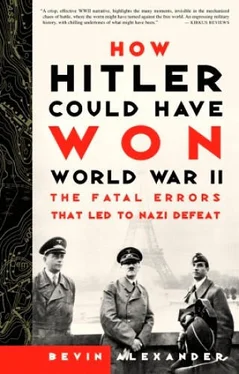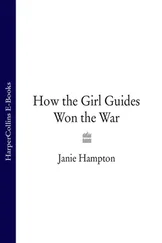From the first day of the invasion, the whole burden of the defense fell on the Germans. Only one major counterattack occurred. The Hermann Göring Division had a force of 56-ton Tiger tanks around Caltagirone, twenty miles inland from the Gela plain. On the morning of July 11, the Tigers overran outposts of the U.S. 1st Infantry Division and those of the 45th Infantry Division, reaching the sand dunes bordering the beaches. It was scary, but well-directed naval gunfire broke up the attacks.
With Italian forces surrendering to any Allied troops that appeared, the Germans withdrew to the northeast corner of Sicily to cover the routes to Messina. They formed a powerful defensive line around the Mount Etna massif with the help of two additional divisions, all under a new headquarters (14th Panzer Corps) commanded by Valentin Hube.
As Montgomery attacked northward up the east coast, Patton’s 7th Army swung around to the west and central portions of the island, captured Palermo, all with little or no opposition, and drove along the north coast toward Messina.
As Sicily was being overrun, the Italians ousted Mussolini on July 25 and turned the government over to the king, Victor Emanuel, and Marshal Pietro Badoglio. The new leaders arrested Mussolini, but to deceive their German allies attested their determination to continue the war, all the while establishing secret contacts in Lisbon with the Allies.
President Roosevelt and Winston Churchill were holding their Quebec conference (code-named Quadrant, August 14–24, 1943), and they superintended the negotiations. Churchill was hoping Mussolini’s ouster would turn the Americans away from Overlord and lead to a move through northern Italy into southern France or toward Vienna. He also sought to wrest Greece and the Balkans from the Germans. He especially wanted landing craft to attack the Italian-ruled island of Rhodes in the Dodecanese Islands in the eastern Mediterranean. On this, Churchill ran up against adamant opposition from General Marshall.
“Forgive me,” Marshall told the prime minister, “but no American soldier is going to die on that goddamn beach.”
At Quadrant the western Allies agreed to opportunistic moves in the Mediterranean, but Overlord was to receive absolute priority.
Hitler recognized that the Italians were going to quit and, equally in secret, set in motion Operation Axis to take over Italy. Marshal Rommel rushed eight divisions into northern Italy—ostensibly to allow the Italian troops there to move south to confront the Allies—and secured the passes through the Alps as well as all key locations in the region. Hitler directed Hube’s troops in Sicily to delay but to evacuate as quickly as possible through Messina. He also ordered SS Captain Otto Skorzeny to spy out the place Il Duce was being held and free him.
General Hube conducted highly effective delaying actions, causing heavy Allied casualties, while, over six days and seven nights, Fregattenkapitän Gustav von Liebenstein, under the cover of German fighter aircraft and strong antiaircraft artillery, evacuated 40,000 German and 60,000 Italian soldiers. Although the Italians left nearly all their equipment, the Germans took off 10,000 vehicles, forty-seven tanks, ninety-four guns, and 17,000 tons of supplies.
On August 17, the Americans and the British arrived in a Messina empty of enemy forces.
Since only about 60,000 Germans had moved into Sicily while 13,500 wounded were evacuated by air and 5,500 were captured, relatively few Germans were killed. Total British casualties were almost 13,000, American 10,000—about 5,500 killed all told.
Marshal Badoglio was getting frightened that the Germans might seize him and the king, and demanded a major landing of Allied paratroops on Rome as a condition of Italian surrender. This was far too dangerous for Eisenhower, since Hitler had moved Kurt Student with his 2nd Parachute Division and the 3rd Panzergrenadier Division close to Rome. Student had instructions to disarm all Italian forces around the capital as soon as Badoglio announced surrender.
It is a comment on Allied and German attitudes that although Badoglio had five Italian divisions at Rome, the Allies had no confidence they could protect a landing site, while Student was sure his much smaller force could eliminate them.
Eisenhower demanded an immediate cease-fire. Badoglio gave in. On September 3, 1943, near Syracuse, Eisenhower’s chief of staff, Walter Bedell Smith, signed the capitulation document with Giuseppe Castellano, who had conducted the Lisbon negotiations. At the same moment, Victor Emanuel and Badoglio received the German ambassador to assure him that Italy would remain true to its Axis partner. On the same day British divisions crossed the Strait of Messina and formed a bridgehead on the Italian mainland. The Allies announced the cease-fire over Radio Algiers on September 8, 1943. Shortly thereafter the main invasion of Italy (Operation Avalanche) began.
Kesselring declared all of Italy to be a war theater. Rommel disarmed Italian troops in the north. Parachutists overpowered Rome. In general the Italian soldiers either took off their uniforms and faded into the population or allowed themselves to be carted off as prisoners of war. Only in the Balkans did a very few Italian units put up some resistance, none effective. It was a pathetic end to Mussolini’s dreams of a new Roman empire. Victor Emanuel, the queen, Crown Prince Umberto, Badoglio, and other members of his government fled to Brindisi on the Adriatic coast.
Most of the Italian fleet surrendered at Malta, but a newly designed German radio-guided gliding bomb sank the Italian flagship, Roma, on the way.
Meanwhile Skorzeny had tracked down the place where Mussolini was being held—on the 2,900-meter Gran Sasso in the Abruzzi Mountains seventy miles northeast of Rome. At 2 P.M. on September 12, 1943, eight gliders landed on the grounds of the Campo Imperiale Hotel. In moments seventy parachutists and Waffen-SS commandos spread out, intimidated the Italian guards, and rescued Mussolini. Shortly afterward a light Fieseler Storch landed on the grounds, picked up Mussolini and Skorzeny, and flew them to a nearby airport, where a transport carried Il Duce to Hitler at Rastenburg in East Prussia. The entire raid took less than twenty minutes.
Mussolini, a broken man, formed a “republican-socialistic government,” with Salò on Lake Garda as his “capital.” But he was a puppet of Hitler, with no power.
Two incidents in Sicily in August cast severe doubt on the capacity of George Patton as a senior commander. Visiting an evacuation hospital August 3, Patton came upon an enlisted man who had no wounds. Patton asked him where he was hurt.
“I guess I can’t take it,” the soldier replied.
Patton burst into a rage, cursed the man, slapped his face with his gloves, and stormed from the tent. The soldier had been diagnosed with dysentery and malaria. That evening Patton issued a memo to commanders berating cowards who went into hospitals “on the pretext that they are nervously incapable of combat.”
On August 10 at another hospital Patton was walking down a line of cots with a medical officer. Coming to a man shivering in bed, Patton asked what the trouble was.
“It’s my nerves,” the soldier said, and started to cry.
“Your nerves, hell,” Patton shouted. “You are just a goddamned coward, you yellow son of a bitch. You’re a disgrace to the army, and you are going back to the front to fight, although that’s too good for you. You ought to be lined up against a wall and be shot. In fact, I ought to shoot you myself right now, goddamn you.”
Patton pulled his pistol from the holster and waved it, then struck the man across the face with the gloves he held in his other hand. He ordered the medical officer to move the man out at once. “I won’t have these other brave boys seeing such a bastard babied.” He started to leave the tent, turned, and hit the weeping soldier again.
Читать дальше


![Джонатан Димблби - Barbarossa - How Hitler Lost the War [calibre]](/books/385421/dzhonatan-dimblbi-barbarossa-how-hitler-lost-the-w-thumb.webp)









